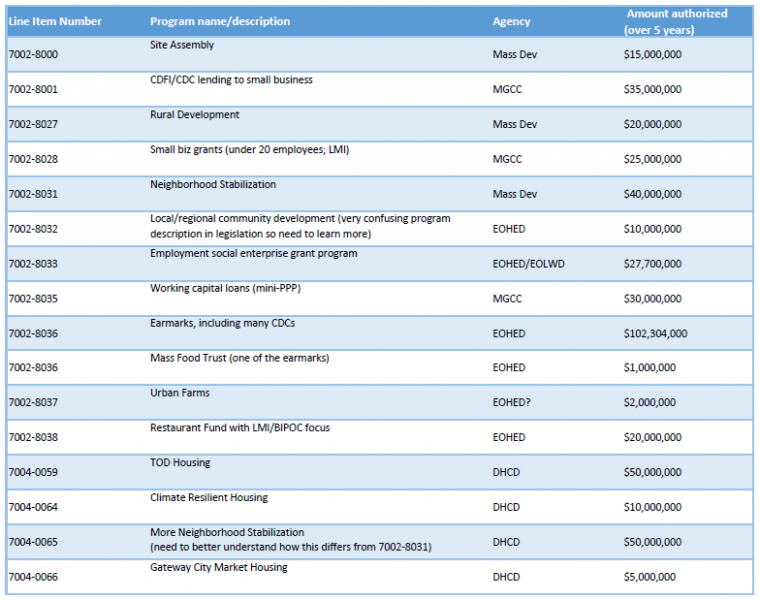Nuestra Comunidad's now completed Bartlett B Project was a part of the Boston Pilot Program. (Photo courtesy of Nuestra Comunidad)
MACDC has been committed to the movement for racial and economic equity since its inception. To solidify this commitment, MACDC has pledged, in its 2018-2023 Strategic Plan, to contribute to the movement by working in four areas of economic development.
“We will continue our long-standing commitment to expanding small business development as a means of building wealth and community assets. To further reduce geographic inequity, we will help to build thriving neighborhoods and rural communities with stores, services, jobs, amenities, transportation and other assets and opportunities. We intend to help our members deliver effective financial empowerment programs to reduce income and wealth inequality. Finally, we will advocate for public policies that promote greater racial and geographic equity. To advance this vision, CDCs, Community Development Financial Institutions (CDFIs) and other community-based groups will need enhanced capacity, access to resources, and stronger public policies.”
Boston Pilot Program
A key initiative in this effort is the Boston Pilot program. In 2012, MACDC and the Massachusetts Minority Contractors Association (MMCA) launched a pilot initiative to achieve higher rates of minority- and women-business participation in CDC-sponsored construction projects in the city of Boston. Four years later, we expanded the partnership (Phase II) to include four more CDCs and to extend the program to Greater Boston.
The original program included six Boston-based CDCs (Madison Park Development Corporation, Dorchester Bay EDC, Jamaica Plain NDC, Codman Square NDC, Nuestra Comunidad, and Urban Edge) that originally enrolled 12 projects in the program and generated collectively more than $61 million in business opportunities for minority- and women-owned businesses (M/WBEs). Four additional CDCs – Somerville Community Corporation (SCC), Neighborhood of Affordable Housing (NOAH), Inquilinos Boricuas en Accion (IBA), and Asian CDC – have now joined the partnership and, collectively, have identified 25 projects with total development cost of $634 million, expected to be completed by 2021.
CDCs participating in the program commit to (1) best faith efforts to achieve 30% MBE and 10% WBE utilization on these construction projects, (2) meaningful opportunities for MBEs and WBEs to serve as general contractors, (3) meaningful opportunities to provide professional services to the project (i.e. legal, architecture, consulting, engineering) and (4) to participate in regular meetings that offer peer-learning, trouble-shooting, and networking events with the broader M/WBE business communities to advance the goals of each CDC and the program overall.
While the focus of this program remains on M/WBE participation – projects reporting as of March 2019 reflect rates of 32% MBE and 9% WBE Contractor Procurement percentages – there is consistent evidence that achieving these goals also will result in the hiring of more people of color on these projects, thereby achieving additional value in our efforts to increase the diversity of the workforce and for expanding economic opportunity across our communities.
Small Business Technical Assistance
Another key initiative promoting racial and economic equity is the Small Business Technical Assistance (SBTA) program.
The Small Business Technical Assistance (SBTA) grant program has been successfully serving businesses for over a decade, and MACDC has been the principal statewide advocacy organization promoting increased funding for this program. The program is also supported by the Black and Latino Advisory Commissions both of which embraced the program in 2019 in their first set of priorities and recommendations.
After leading a statewide campaign, MACDC was grateful in July when the Baker administration and the Legislature agreed to increase funding for this program to $3.1 million in FY 2020 – a 50% increase from the prior year – that will empower an outstanding network of “Grantees,” – CDCs, CDFIs, and other community-based groups – to continue to help small businesses grow and thrive in every community. These grants range from $10,000 to $120,000 and allow CDCs and other community-based organizations to provide customized management and operational assistance, financial training, and lending services to small businesses. These resources are targeted to serving low- and moderate-income communities.
MACDC also has advocated for a related Microlending and Community Development Capital Program, which was reauthorized through the 2018 economic development bond bill at $1.25 million. The Microlending program enables program partners to leverage more federal and private funding. For example, the national CDFI program requires a dollar-for-dollar match, and the Small Business Administration Micro Loan Program requires a 15% local match. This program helps Massachusetts leverage more of these funds. This year, the Baker Administration is making $250,000 available through this program and we will be advocating to increase that number next year.
Massachusetts needs a strong network of community-based small business programs in order to address decades of structural and systemic racism that has led to the racial wealth gap in Massachusetts and across this country. By advocating for the Small Business Technical Assistance and Micro Lending programs, we hope to contribute to closing that gap and helping more people of color and immigrants build their business, create wealth and expand opportunities for communities of color across the state.










